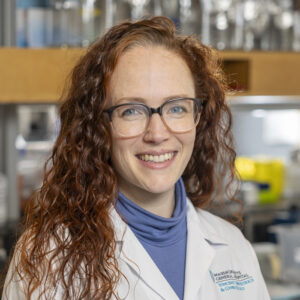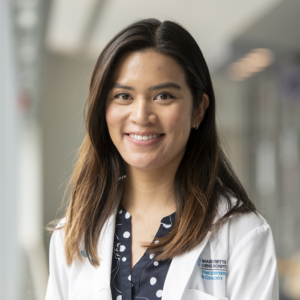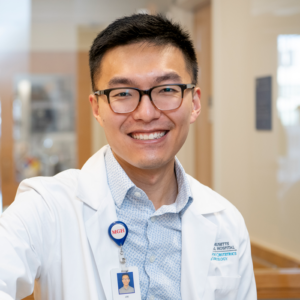VINCENT FELLOWS IN FEMALE PELVIC MEDICINE AND RECONSTRUCTIVE SURGERY
Advancing Urinary and Vaginal Health
To help women return to a normal lifestyle. the Female Pelvic Medicine and Reconstructive Surgery (Urogynecology) program provides Vincent OB/GYN patients comprehensive evaluations and treatment for female pelvic floor problems, including pelvic organ prolapse and urinary incontinence. In lab research, our Vincent fellows are seeking novel ways to prevent and treat urinary and vaginal infections.

Are Vaginal Lactobacillus Species and Cytokine Activity in Postmenopausal Women Associated with Overactive Bladder Symptoms?
Faculty Mentors
Caroline Mitchell, MD, MPH, Investigator, Vincent Center for Reproductive Biology
Milena Weinstein, MD, Chief, Division of Female Pelvic Medicine and Reconstructive Surgery (FPMRS), Vice Chair, Vincent Department of Obstetrics and Gynecology
Emily Von Bargen, DO, FPMRS Fellowship Program Director
Kristin Hung, MD, FPMRS Faculty
Marcus Ortega, MD, FPMRS Faculty
Career Path
DO: West Virginia School of Osteopathic Medicine, 2014–2018
OB/GYN Residency: University of Virginia, 2018–2022
Vincent Fellowship: 2022–2025

What Is the Role of Vaginal Microbiota in Tissue Repair Following Gynecologic Surgery
Vi Duong, MD, a Vincent fellow in Female Pelvic Medicine and Reconstructive Surgery, is investigating the role of vaginal microbiota in tissue repair and wound healing following gynecologic surgery. Vaginal microbiota dominated by Lactobacillus species is associated with better reproductive health outcomes than the highly diverse, anaerobic-predominant bacterial community associated with bacterial vaginosis. Building upon prior research on vaginal epithelial healing, Dr. Duong is evaluating the role of healthy and pathogenic flora on cellular proliferation of vaginal fibroblasts — the principal cells that produce collagen and the extracellular matrix, which play a critical role in tissue repair. This potentially will lead to a better understanding of the mechanism behind differences in wound healing following surgery as well as interventions to reduce postoperative complications in patients.
Faculty Mentors
Caroline Mitchell, MD, MPH, Investigator, Vincent Center for Reproductive Biology, Division of Female Pelvic Medicine and Reconstructive Surgery (FPMRS)
Milena Weinstein, MD, FPMRS Fellowship Program Director
May Wakamatsu, MD, Chief, Division of FPMRS, Vice-Chair, Vincent Department of Obstetrics and Gynecology
Emily Von Bargen, DO, Assistant FPMRS Fellowship Program Director
Kristin Hung, MD, FPMRS Faculty
Career Path
MD: Georgetown University School of Medicine, 2013–2017
OB/GYN Residency: MedStar Washington Hospital Center, 2017–2021
Vincent Fellowship: 2021–2024

Does the Vaginal Microbiome Affect Surgical Healing?
Joe Shi, MD, a Vincent fellow in Female Pelvic Medicine and Reconstructive Surgery, is investigating the role of vaginal microbiota in tissue healing following gynecologic surgery. A vaginal microbiota dominated by Lactobacillus species is associated with better reproductive health outcomes than the diverse, anaerobe-dominant community known as bacterial vaginosis. Clinically, studies have shown that women with bacterial vaginosis are at increased risk vaginal cuff complications after hysterectomy, which are associated with significant morbidity and even mortality. Dr. Shi is evaluating the role of healthy and pathogenic flora on vaginal epithelial healing. This will hopefully lead to a better understanding of the mechanism behind poorer healing after surgery and potentially lead to interventions to reduce postoperative risks for these patients.
Faculty Mentors
Caroline Mitchell, MD, MPH, Investigator, Vincent Center for Reproductive Biology, Division of Female Pelvic Medicine and Reconstructive Surgery (FPMRS)
Milena Weinstein, MD, FPMRS Fellowship Program Director
May Wakamatsu, MD, Chief, Division of FPMRS, Vice-Chair, Vincent Department of Obstetrics and Gynecology
Emily Von Bargen, DO, Assistant FPMRS Fellowship Program Director
Kristin Hung, MD, FPMRS Faculty
Liliana Bordeianou, MD, MPH, Chief, Colorectal Surgery
Career Path
MD: Saint Louis University, 2012–2016
OB/GYN Residency: Saint Louis University, 2016–2020
Vincent Fellowship: 2020–2023
